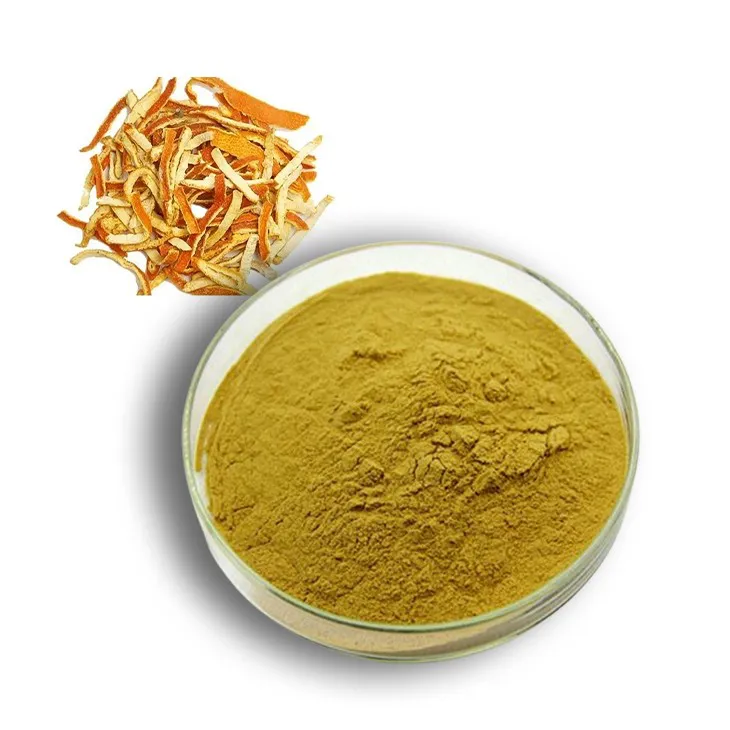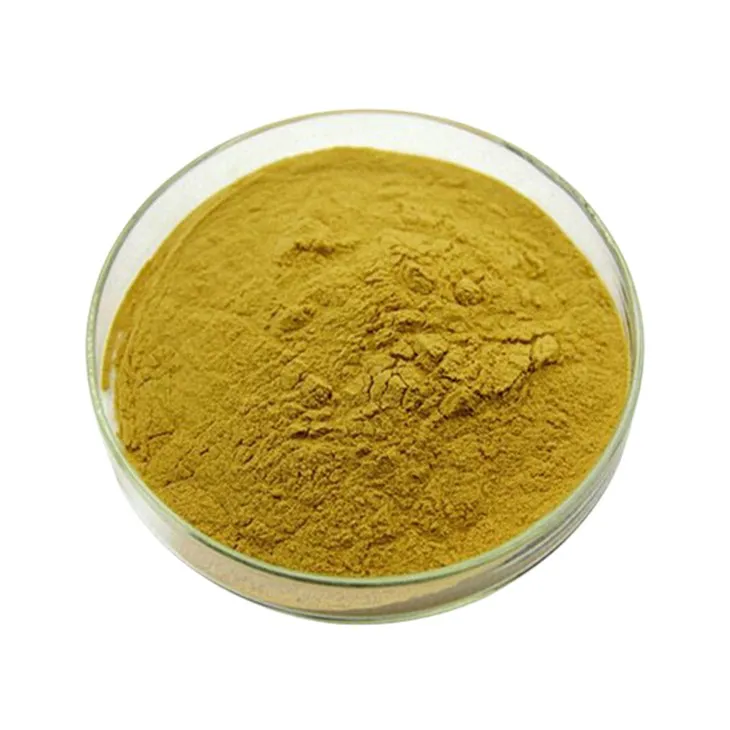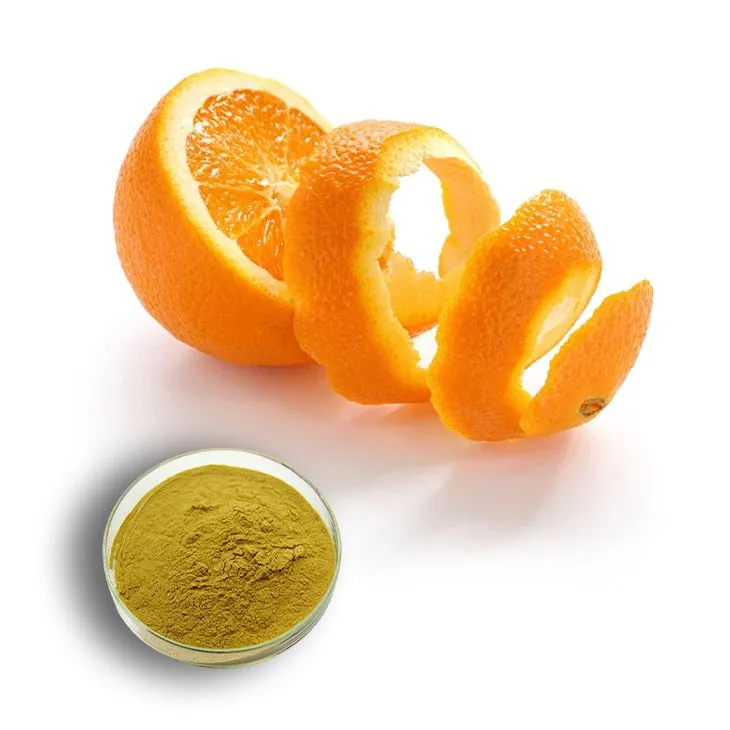- 0086-571-85302990
- sales@greenskybio.com
Application of Hesperidin in Skin Care.
2024-11-11

1. Introduction to Hesperidin
Hesperidin is a flavonoid that is naturally found in citrus fruits, such as oranges, lemons, and grapefruits. It has been the subject of increasing research in recent years due to its potential benefits in various fields, particularly in skin care. This natural compound is known for its diverse range of biological activities, which make it a promising ingredient for the development of skin - care products.

2. Antioxidant Properties of Hesperidin in Skin Care
2.1. Role of Antioxidants in Skin Health
The skin is constantly exposed to environmental stressors, such as ultraviolet (UV) radiation, pollution, and free radicals. These factors can lead to the production of reactive oxygen species (ROS), which cause oxidative stress in the skin. Oxidative stress is a major contributor to skin aging, as it damages cellular components like DNA, proteins, and lipids. Antioxidants play a crucial role in neutralizing ROS and preventing oxidative damage. They act as scavengers, donating electrons to free radicals and converting them into less reactive molecules.
2.2. Hesperidin as a Potent Antioxidant
Hesperidin has been shown to possess strong antioxidant capabilities. In vitro studies have demonstrated its ability to scavenge various ROS, including superoxide anions, hydroxyl radicals, and peroxyl radicals. By reducing the oxidative stress in the skin, hesperidin can help prevent premature aging symptoms, such as wrinkles, fine lines, and loss of skin elasticity. It also helps in maintaining the overall health and integrity of the skin cells.

3. Impact of Hesperidin on Skin Hydration
3.1. Importance of Skin Hydration
Proper skin hydration is essential for maintaining healthy - looking skin. The skin's outermost layer, the stratum corneum, acts as a barrier to prevent water loss and protect the underlying tissues from external aggressors. When the skin is dehydrated, it can become dry, rough, and more prone to developing various skin problems, such as flakiness and irritation.
3.2. How Hesperidin Enhances Skin Hydration
Hesperidin has been found to increase the water - holding capacity of the skin. It does this by interacting with the components of the skin's extracellular matrix, such as hyaluronic acid and collagen. By promoting the synthesis and retention of these substances, hesperidin helps to keep the skin moisturized. This results in a more supple, smooth, and radiant complexion.

4. Hesperidin and Skin's Immune Response
4.1. The Skin's Immune System
The skin is the body's first line of defense against external pathogens and environmental insults. It has a complex immune system that includes various immune cells, such as keratinocytes, Langerhans cells, and lymphocytes. These cells work together to recognize and respond to foreign invaders and maintain skin homeostasis.
4.2. Modulation of Skin's Immune Response by Hesperidin
Hesperidin can modulate the skin's immune response in several ways. It has been shown to enhance the function of immune cells in the skin, such as by increasing the phagocytic activity of macrophages. This helps in clearing away pathogens and damaged cells more effectively. Additionally, hesperidin can regulate the production of cytokines, which are signaling molecules involved in immune responses. By maintaining a balanced cytokine profile, hesperidin helps to protect the skin against inflammation and autoimmune reactions.

5. Incorporating Hesperidin into Skin - Care Products
5.1. Types of Skin - Care Products Containing Hesperidin
Hesperidin can be found in a variety of skin - care products, including creams, lotions, serums, and masks. These products are designed to target different skin concerns, such as anti - aging, hydration, and skin protection.
- Anti - aging creams containing hesperidin are formulated to reduce the appearance of wrinkles and fine lines by combating oxidative stress and promoting collagen synthesis.
- Hydrating lotions with hesperidin are aimed at improving skin moisture levels and maintaining a healthy skin barrier.
- Serums with a high concentration of hesperidin are often used for intensive skin treatment, as they can penetrate deeper into the skin and deliver a more potent dose of the active ingredient.
- Face masks with hesperidin can provide a short - term boost to the skin, leaving it refreshed and rejuvenated.
5.2. Considerations for Using Hesperidin - based Skin - Care Products
When using hesperidin - based skin - care products, it is important to consider a few factors. Firstly, individuals with sensitive skin should perform a patch test before using a new product to ensure that they do not experience any allergic reactions. Secondly, the concentration of hesperidin in the product can vary, and higher concentrations may not necessarily be more effective. It is advisable to follow the product instructions and consult a dermatologist if needed.
6. Clinical Studies and Evidence
6.1. Overview of Clinical Trials
Several clinical studies have been conducted to evaluate the efficacy of hesperidin in skin care. These studies have involved a range of participants, including both healthy individuals and those with specific skin conditions.
6.2. Results of Anti - aging Studies
In anti - aging studies, participants who used hesperidin - containing skin - care products for a certain period showed significant improvements in skin elasticity, reduction in wrinkle depth, and an overall more youthful appearance. These results were attributed to the antioxidant and collagen - promoting properties of hesperidin.
6.3. Findings on Skin Hydration
Clinical trials focusing on skin hydration have demonstrated that hesperidin - based products can increase skin moisture content. Participants reported a decrease in skin dryness and an improvement in skin texture, indicating the effectiveness of hesperidin in enhancing skin hydration.
6.4. Immune - related Results
Some studies have also investigated the impact of hesperidin on the skin's immune response. These studies have shown that hesperidin can enhance the skin's resistance to infections and reduce inflammation, further supporting its role in maintaining skin health.
7. Future Perspectives
7.1. Potential for New Product Development
As the understanding of hesperidin's benefits in skin care continues to grow, there is great potential for the development of new and innovative skin - care products. Researchers may explore different formulations and combinations with other active ingredients to enhance the efficacy of hesperidin - based products.
7.2. Research on Long - term Effects
While current studies have shown promising short - term and medium - term results, more research is needed to understand the long - term effects of hesperidin on the skin. Long - term studies could provide valuable insights into its safety and effectiveness over extended periods of use.
7.3. Exploration of Hesperidin in Other Skin Conditions
Hesperidin has mainly been studied in the context of anti - aging, hydration, and general skin health. However, there is potential for further exploration of its role in treating other skin conditions, such as acne, psoriasis, and eczema.
FAQ:
1. What is the main function of hesperidin in skin care?
Hesperidin has multiple functions in skin care. Its main functions include strong antioxidant capabilities to scavenge reactive oxygen species, preventing oxidative stress - related skin aging. It also can increase the water - holding capacity of the skin for better skin hydration and modulate the skin's immune response to protect against external aggressors and promote skin homeostasis.
2. How does hesperidin prevent skin aging?
Hesperidin prevents skin aging by scavenging reactive oxygen species. Oxidative stress is one of the main causes of skin aging. By eliminating these harmful substances, hesperidin can reduce the damage to skin cells caused by oxidative stress, thus preventing skin aging.
3. Can hesperidin improve skin hydration?
Yes, it can. Hesperidin can increase the water - holding capacity of the skin. This means it helps the skin to retain more moisture, which is beneficial for improving skin hydration.
4. How does hesperidin modulate the skin's immune response?
Hesperidin can interact with various immune - related cells and molecules in the skin. It may regulate the production of cytokines and other signaling molecules, which are important for the proper functioning of the skin's immune system. By doing so, it can protect the skin from various external threats and maintain skin homeostasis.
5. Is hesperidin suitable for all skin types?
There is currently no evidence indicating that hesperidin is not suitable for certain skin types. However, more research may be needed. Generally, its antioxidant, hydrating and immune - modulating properties can potentially benefit different skin types, such as dry, oily or sensitive skin, but individual reactions may vary.
Related literature
- The Role of Hesperidin in Skin Health and Cosmetic Applications"
- "Antioxidant Properties of Hesperidin in Skin Care: A Review"
- "Hesperidin and Skin Hydration: Mechanisms and Potential"
- ▶ Hesperidin
- ▶ citrus bioflavonoids
- ▶ plant extract
- ▶ lycopene
- ▶ Diosmin
- ▶ Grape seed extract
- ▶ Sea buckthorn Juice Powder
- ▶ Beetroot powder
- ▶ Hops Extract
- ▶ Artichoke Extract
- ▶ Reishi mushroom extract
- ▶ Astaxanthin
- ▶ Green Tea Extract
- ▶ Curcumin Extract
- ▶ Horse Chestnut Extract
- ▶ Other Problems
- ▶ Boswellia Serrata Extract
- ▶ Resveratrol Extract
- ▶ Marigold Extract
- ▶ Grape Leaf Extract
- ▶ blog3
- ▶ blog4
- ▶ blog5
-
Organic Tongkat Ali extract powder factory.
2024-11-11
-
How to make powder with ashwagandha extract.
2024-11-11
-
Rosehip extract manufacturers from China.
2024-11-11
-
The best cat's claw extract in nature.
2024-11-11
-
Chinese Dandelion Leaf Extract Suppliers.
2024-11-11
-
Shikonin
2024-11-11
-
Feverfew Extract
2024-11-11
-
Quercetin
2024-11-11
-
Tongkat Ali Extract Powder
2024-11-11
-
Apricot Powder
2024-11-11
-
Ginseng Root Extract
2024-11-11
-
Lemon Juice Powder
2024-11-11
-
Thunder God Vine Extract
2024-11-11
-
Andrographis Paniculata Extract Powder
2024-11-11
-
Clove Powder
2024-11-11





















